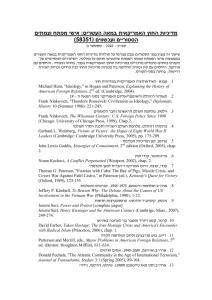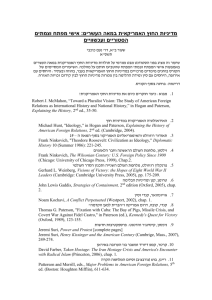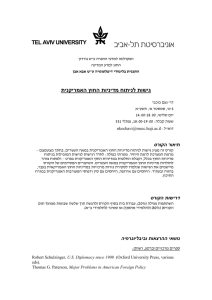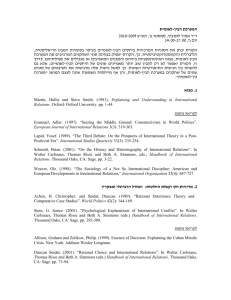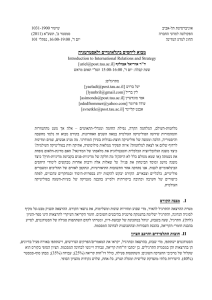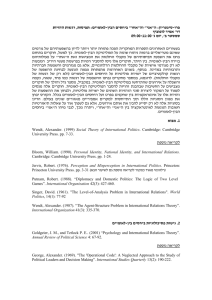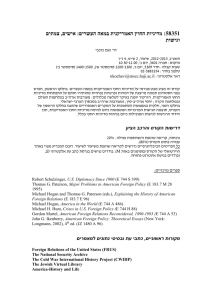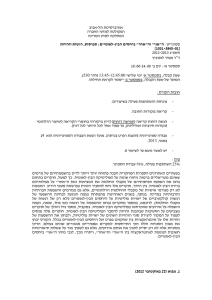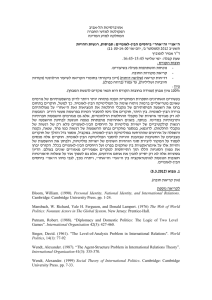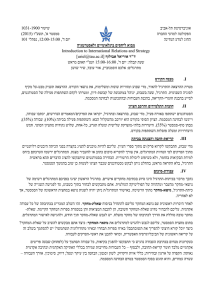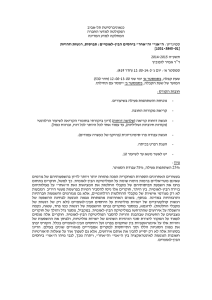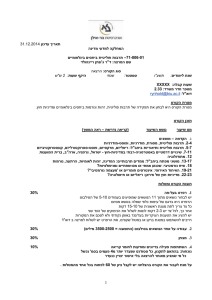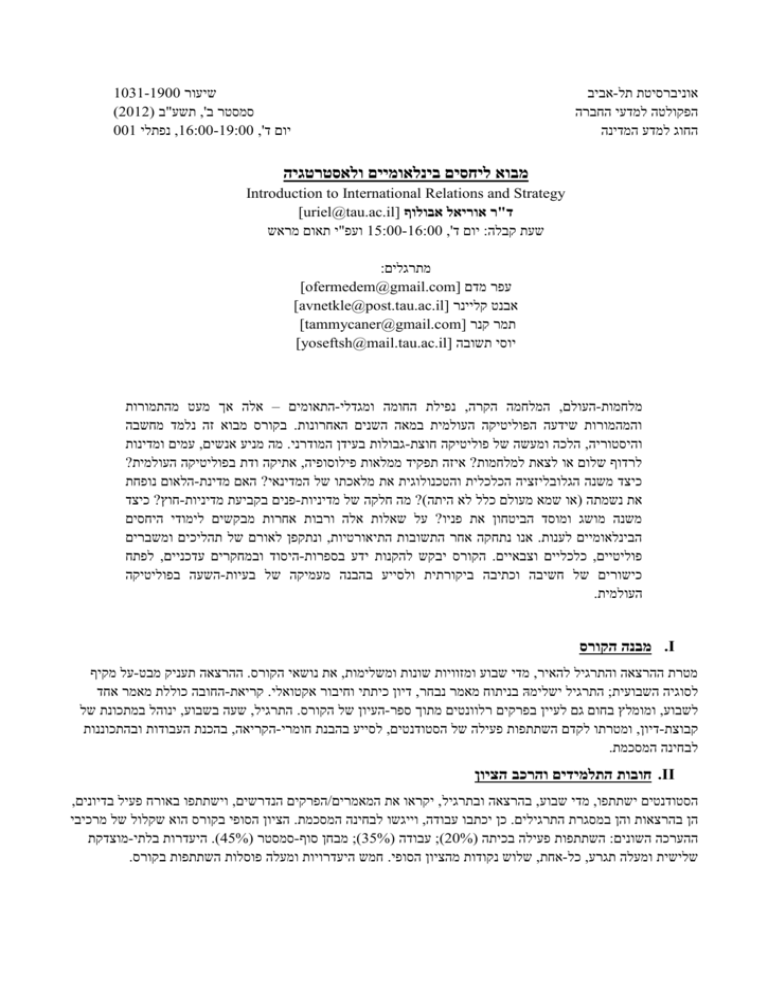
שיעור 1031-1900
סמסטר ב' ,תשע"ב ()2012
יום ד' ,16:00-19:00 ,נפתלי 001
אוניברסיטת תל-אביב
הפקולטה למדעי החברה
החוג למדע המדינה
מבוא ליחסים בינלאומיים ולאסטרטגיה
Introduction to International Relations and Strategy
ד"ר אוריאל אבולוף []uriel@tau.ac.il
שעת קבלה :יום ד' 15:00-16:00 ,ועפ"י תאום מראש
מתרגלים:
עפר מדם []ofermedem@gmail.com
אבנט קליינר []avnetkle@post.tau.ac.il
תמר קנר ][tammycaner@gmail.com
יוסי תשובה []yoseftsh@mail.tau.ac.il
מלחמות-העולם ,המלחמה הקרה ,נפילת החומה ומגדלי-התאומים – אלה אך מעט מהתמורות
והמהמורות שידעה הפוליטיקה העולמית במאה השנים האחרונות .בקורס מבוא זה נלמד מחשבה
והיסטוריה ,הלכה ומעשה של פוליטיקה חוצת-גבולות בעידן המודרני .מה מניע אנשים ,עמים ומדינות
לרדוף שלום או לצאת למלחמות? איזה תפקיד ממלאות פילוסופיה ,אתיקה ודת בפוליטיקה העולמית?
כיצד משנה הגלובליזציה הכלכלית והטכנולוגית את מלאכתו של המדינאי? האם מדינת-הלאום נופחת
את נשמתה (או שמא מעולם כלל לא היתה)? מה חלקה של מדיניות-פנים בקביעת מדיניות-חוץ? כיצד
משנה מושג ומוסד הביטחון את פניו? על שאלות אלה ורבות אחרות מבקשים לימודי היחסים
הבינלאומיים לענות .אנו נתחקה אחר התשובות התיאורטיות ,ונתקפן לאורם של תהליכים ומשברים
פוליטיים ,כלכליים וצבאיים .הקורס יבקש להקנות ידע בספרות-היסוד ובמחקרים עדכניים ,לפתח
כישורים של חשיבה וכתיבה ביקורתית ולסייע בהבנה מעמיקה של בעיות-השעה בפוליטיקה
העולמית.
.Iמבנה הקורס
מטרת ההרצאה והתרגיל להאיר ,מדי שבוע ומזוויות שונות ומשלימות ,את נושאי הקורס .ההרצאה תעניק מבט-על מקיף
לסוגיה השבועית; התרגיל ישלימּה בניתוח מאמר נבחר ,דיון כיתתי וחיבור אקטואלי .קריאת-החובה כוללת מאמר אחד
לשבוע ,ומומלץ בחום גם לעיין בפרקים רלוונטים מתוך ספר-העיון של הקורס .התרגיל ,שעה בשבוע ,ינוהל במתכונת של
קבוצת-דיון ,ומטרתו לקדם השתתפות פעילה של הסטודנטים ,לסייע בהבנת חומרי-הקריאה ,בהכנת העבודות ובהתכוננות
לבחינה המסכמת.
.IIחובות התלמידים והרכב הציון
הסטודנטים ישתתפו ,מדי שבוע ,בהרצאה ובתרגיל ,יקראו את המאמרים/הפרקים הנדרשים ,וישתתפו באורח פעיל בדיונים,
הן בהרצאות והן במסגרת התרגילים .כן יכתבו עבודה ,וייגשו לבחינה המסכמת .הציון הסופי בקורס הוא שקלול של מרכיבי
ההערכה השונים :השתתפות פעילה בכיתה ( ;)20%עבודה ( ;)35%מבחן סוף-סמסטר ( .)45%היעדרות בלתי-מוצדקת
שלישית ומעלה תגרע ,כל-אחת ,שלוש נקודות מהציון הסופי .חמש היעדרויות ומעלה פוסלות השתתפות בקורס.
מבוא ליחסים בינלאומיים ואסטרטגיה [ ,]1031-1900אוניברסיטת תל-אביב ,החוג למדע-המדינה
.III
קריאת-חובה והצגתה בכיתה
מדי שבוע ,לקראת התרגיל /השיעור (הראשון מבין השניים) ,תתבקשו לקרוא פרק מתוך ספר העיון ,וכן – לקראת שלושה
מהשיעורים – מאמר .עליכם להיות מוכנים להציג בקצרה בפני הכיתה היבטים רלוונטים מתוך הפרק/המאמר לפי הנחיות
המתרגלים .אין צורך להקריא סיכום כתוב או להעביר מצגת .המתרגלים ירשמו הערכתם ביחס למידת הבקיאות בחומר,
ולא כשיפוט ליכולת הרטורית או אף לניתוח מדוקדק וביקורתי של המאמר ,אף כי אלו יתקבלו כמובן בברכה .נדגיש:
הבחירה בסטודנטים שיתבקשו להציג הדברים תהא בראשית התרגיל ,ולא תקבלו על כך התראה מראש; בהחלט ניתן לבקש
מסטודנטים שכבר הציגו לעשות כן שוב בהמשך הסמסטר.
.IV
עבודת-סיכום
נדבך מרכזי בכיתות-התרגיל הינו סיוע בכתיבת מחקרים אישיים .לפיכך ,כמחצית שעת-תרגול ,מדי שבוע ,תנוהל כסדנת-
מחקר .בתרגיל הראשון יציגו בפניכם המתרגלים רשימה של נושאי-מחקר מהעבר ומההווה של הפוליטיקה העולמית .אתם
מתבקשים לבחור בתוך כשבוע ,עד לפגישה השנייה של כיתת-התרגיל ,נושא-מחקר מתוך הרשימה .באישור המתרגל/ת
ניתן יהיה לשנות נושא במחצית הראשונה של הסמסטר ,אך לא לאחריה.
לאחר היכרות ראשונית עם נושא המחקר עליכם להתחיל בניסוח שאלת-מחקר .זהו השלב המכריע בכתיבתה של כל עבודה
אקדמית .עליכם להבהיר מדוע שאלת-המחקר חשובה ,הן להבנת המציאות והן במסגרת ספרות המחקר הקיימת .שאלת-
מחקר טובה סוללת את הדרך לכתיבתו של מחקר מוצלח .יש לגבש שאלת-מחקר תוך חודש ,ולהגישה לאישרו המתרגלים.
לאחר מחצית הסמסטר (מועד מדויק ייקבע בהמשך) ,עליכם לגבש ולהגיש למתרגלים את מתאר-המחקר :כיצד אתם
מבקשים להשיב על שאלת-המחקר? כיצד יוכל קורא חיצוני להפריך את תשובתכם? באיזו ספרות תבחרו ובאיזו
מתודולוגיה תשתמשו? יש להסתמך בשלב זה על קריאה ראשונית של הביבליוגרפיה האפשרית ,וכדאי לתכנן את ראשי-
הפרקים לעבודה .כאמור ,מטרה מרכזית של התרגילים היא לשמש כסדנת-מחקר בכתיבת העבודות – השתמשו בפגישות
השבועיות ,ובפגישות אישיות עם המתרגלים ,כדי לקדם את מחקרכם.
כעקרונות מנחים בכתיבת העבודה נדגיש כי תתבקשו להפגין בקיאות ,כל עבודה תסתמך על (לפחות) שבעה פריטים
אקדמיים מלבד חומר קריאת-החובה ,ולבסוף – כל העבודות מחייבות עמידה בכללי האתיקה האקדמית וכתיבה אקדמית
נאותה :הקפדה על ארגון ובהירות; כללי איות ודקדוק; לשון וסגנון; הבחנה בין עיקר וטפל; דיוק; סימוכין .אורך העבודה –
עשרה עמודים לכל היותר ,והיא תוגש בסוף הסמסטר בטרם הבחינה המסכמת (מועד מדויק ייקבע בהמשך).
דוגמא :מכלל נושאי-המחקר שהציגה בפניכם המתרגלת ,בחרת לעסוק בתפקידו ובתפקודו של האו"ם
במשבר ביוגוסלביה .לקראת השיעור השני ,בו נדון במפלסי-ניתוח ,קראת את הפרק הראשון במקראה של
איתן גלבוע ("היחסים הבינלאומיים כתחום מדעי") .ההסבר של גלבוע בדבר מפלסי הניתוח (פרט ,מדינה
ומערכת) ,העלה בדעתך את השאלה החשובה :מהם מפלסי הניתוח בהבנת פעילות השכנת השלום של
האו"ם – האם פרט ,מדינה או מערכת? ומהו האו"ם – שחקן או מבנה? מכאן הגעת לשאלת-מחקר
אפשרית :כיצד השפיעה רמת הפרט ,חילופי-גברי בתפקיד מזכ"ל האו"ם (בין בוטרוס-ראלי לקופי אנאן),
על מדיניות האו"ם במשבר ביוגוסלביה? בהמשך השתלבה שאלת-מחקר זו בנושאי-דיון נוספים במהלך
הקורס ,למשל – האם נכונה טענת הניאו-ריאליזם כי מבנה המערכת חשוב יותר מהעדפות אישיות של
מנהיגים? האם נהג האו"ם על-פי מודל קבלת ההחלטות הרציונאלי ,הבירוקרטי או הארגוני? כיצד השפיעו
עקרונות המשפט הבינלאומי על מדיניות האו"ם?
.V
בחינה מסכמת
בתום הסמסטר ייערך מבחן שיבדוק יכולת ניתוח ,הבנה ובקיאות בחומרי-הקריאה ובדיוני-הכיתה .הבחינה מיועדת לשלב
בין מגוון נושאי הלימוד ,ולהעריך את יכולת הסטודנטים להצביע על קשרים והקשרים בין מודלים תיאורטיים למקרים
אמפיריים .הבחינה תכלול גם פרק בקיאות גיאו-פוליטית.
2
מבוא ליחסים בינלאומיים ואסטרטגיה [ ,]1031-1900אוניברסיטת תל-אביב ,החוג למדע-המדינה
נושאים ורשימת-קריאה
.VI
במחצית הראשונה של הקורס נכשיר את הקרקע התיאורטית והאמפירית להבנת הפוליטיקה העולמית.
ארבעת השיעורים הראשונים יוקדשו להיכרות עם היחסים הבינלאומיים כתחום-ידע ועם המודלים והפולמוסים
התיאורטיים המכוננים של המחקר העכשווי.
בשני השיעורים הבאים נתחקה בקצרה אחר ההיסטוריה של הפוליטיקה העולמית מימי הביניים ועד ימינו.
נסיים את המחצית השנייה של הקורס בשיעור בסיכום תובנות תיאורטיות ואמפיריות.
במחצית השנייה של הקורס נדון בנושאי-מפתח בפוליטיקה העולמית בת-זמננו:
אסטרטגיה וביטחון
מדיניות חוץ וקבלת-החלטות
אתיקה ,משפט וארגונים בינלאומיים
כלכלה פוליטית בינלאומית
פוליטיקה של זהויות
גלובליזציה
השיעור האחרון יוקדש לדיון במקומה של ישראל בפוליטיקה העולמית ,לסיכום הקורס ולהכנה לבחינה.
קריאת החובה לכל השיעורים מופיעה בעמוד הבא ,וכוללת ,בצד שלושה מאמרים חשובים ,פרקים רלוונטים מתוך ספר
עיון ,שפרקיו זמינים להורדה כקובצי PDFמאתר הספרייה:
Mansbach, Richard W., and Kirsten L. Rafferty. 2007. Introduction to Global Politics: A Journey
from Yesterday to Tomorrow. New York, NY: Routledge.
בכותרת כל שיעור תמצאו את הפרק הרלוונטי לקריאת-חובה מתוך ספר זה.
קריאת-רשות מופיעה מעמוד 5ואילך ,וכוללת מספר רב של פריטים להרחבת-אופקים .במרבית נושאי השיעור תמצאו
פרקים מתוך הספר הבא (שיופיעו בקיצור כ:)[OHIR]-
Reus-Smit, Christian, and Duncan Snidal. 2008. The Oxford Handbook of International Relations.
New York: Oxford University Press.
הדף הבא מרכז את לוח-הזמנים לקורס .בגרסא הדיגיטלית של הקובץ תמצאו לאחר דף זה את תוכנית-הקורס השלמה ,בה
מפורטים תכני השיעורים ,והיא כוללת רשימת קריאה מורחבת.
בהצלחה!
אוריאל
3
מבוא ליחסים בינלאומיים ואסטרטגיה [ ,]1031-1900אוניברסיטת תל-אביב ,החוג למדע-המדינה
לוח-זמנים
להלן תמצית תוכנית הלימודים :מספר השיעור ,נושאו ,מאמרי-החובה ,ופרק(ים) לקריאת-חובה מתוך ספר-העיון [בסוגריים
מרובעים].
.1
למה לי פוליטיקה (עולמית) עכשיו?
.2
מבנה ,שחקנים ומפלסי-ניתוח [פרק ]1
.3
מוקדי-ויכוח :Iריאליזם וליברליזם [פרקים ]6 ,1
Gilpin, Robert G. 1984. The Richness of the Tradition of Political Realism. International
Organization 38(2): 287-304.
מוקדי-ויכוח " :IIהגל החדש" [פרקים ]6 ,1
.5
התפתחות היחב"ל :Iפוליטיקה עולמית מימי-הביניים ועד מלחמת-העולם הראשונה [פרקים ]3 ,2
.6
התפתחות היחב"ל :IIמלחמת העולם השנייה והמלחמה הקרה [פרקים ]4 ,3
.7
ביטחון ואסטרטגיה [פרק ]7
.8
מדיניות-חוץ וקבלת-החלטות [פרק ]8
Allison, Graham T. 1969. Conceptual Models and the Cuban Missile Crisis. The American
Political Science Review 63(3): 689-718.
אתיקה ,האסכולה האנגלית ,משפט וארגונים בינלאומיים [פרק ]9
.4
.
.9
.10כלכלה פוליטית בינלאומית [פרק ]11
.11פוליטיקה של זהויות [פרק ]15
Huntington, Samuel P. 1993. “The Clash of Civilizations?” Foreign Affairs 72 (3):22-49.
תרגום :הנטינגטון ,סמואל" .2000 .התנגשות הציביליזציות" .תכלת ,אביב התש"ס129-157 ,
.12גלובליזציה ,אקולוגיה וקץ-ההיסטוריה [פרק ]16
.13השלמות וסיכום ,ואם יתיר הזמן -ישראל בפוליטיקה העולמית והכנה לבחינה
4
המדינה- החוג למדע,אביב- אוניברסיטת תל,]1031-1900[ מבוא ליחסים בינלאומיים ואסטרטגיה
,העיון-קריאת החובה מתוך ספר- בכותרת כל שיעור (מהשיעור השני ואילך) יצוינו פרקי.להלן תוכנית הלימודים המפורטת
.)גישה אוניברסיטאית (דרך קטלוג הספריה-שהינו זמין בגרסא מלאה ברשת לבעלי הרשאת
והן מאמרי, שתוכל לסייע לכם בין השאר בכתיבת העבודות,רשות-השיעור תמצאו הן המלצות לקריאת-בתחתית תיאור
.)החובה (מודגשים-קריאת
? למה לי פוליטיקה (עולמית) עכשיו.1
ציפיות; דיון בסילבוס הקורס- היכרות ותיאום.א
)יום שלנו (סיכויים וסיכונים- על צמיחת תחום היחסים הבינלאומיים כענף אקדמי; הרלוונטיות שלו לחיי היום.ב
? תורת התיאוריה – מהי תיאוריה ומה ערכה.ג
טעימות ראשונות משלל נושאי הקורס.ד
Christian Reus-Smit and Duncan Snidal. Between Utopia and Reality: The Practical Discourses of
International Relations [OHIR 3-37].
Joseph S. Nye, Jr. International Relations: The Relevance of Theory to Practice [OHIR 648-660]
Hoffmann, Stanley. 1977. “An American Social Science: International Relations.” Daedalus 106
(3):41-60.
Hollis, Martin, and Steve Smith. 1990. Explaining and Understanding International Relations.
Oxford: Clarendon Press, pp. 1-44.
Lepgold, Joseph. 1998. Is Anyone Listening? International Relations Theory and the Problem of
Policy Relevance. Political Science Quarterly 113: 43-62.
Maliniak, Daniel, Amy Oakes, Susan Peterson, and Michael J. Tierney. 2007. Inside the Ivory
Tower. Foreign Policy (159):62-68.
Nicholson, Michael. 2000. What's the Use of International Relations? Review of International
Studies 26(2): 183-98.
Peterson, Susan, Michael J. Tierney, and Daniel Maliniak. 2005. Inside the Ivory Tower. Foreign
Policy (151):58-64.
Rosenau, James N. 1980. The Scientific Study of Foreign Policy. Rev. and enl. ed. New York:
Nichols Pub. Co. [“Thinking Theory Thoroughly,” pp.19-31]
Tickner, J. Ann, and Andrei P. Tsygankov. 2008. Responsible Scholarship in International Relations:
A Symposium. International Studies Review 10(4): 661-66.
Waever, Ole. 1998. The Sociology of a Not So International Discipline: American and European
Developments in International Relations. International Organization 52(4): 687-727.
]1 ניתוח [פרק- שחקנים ומפלסי, מבנה.2
חברתי- המפתח לניתוח פוליטי:)Structure and Agency( מבנה ושחקנים.א
מה המשקל הסגולי והייחודי של כל אחת:)עולמית/ מדינה ומערכת (אזורית, פרט:ניתוח- שלושה מפלסי.ב
?המבט? כיצד ניתן לשלבן-מנקודות
, עם עובד:אביב- (תל,לאומיים- יחסים בין,) איתן גלבוע (עורך: בתוך," "היחסים הבינלאומיים כתחום מדעי, איתן,גלבוע
11-33 ,)1978
David A . Lake. The State and International Relations. [OHIR 41-61]
5
המדינה- החוג למדע,אביב- אוניברסיטת תל,]1031-1900[ מבוא ליחסים בינלאומיים ואסטרטגיה
Buzan, Barry. 1995. The Level of Analysis Problem in International Relations Reconsidered. In
International Relations Theory Today, edited by Ken Booth and Steve Smith, 198-216.
University Park, Pa.: Pennsylvania State University Press.
Carlsnaes, Walter. 1992. The Agency-Structure Problem in Foreign Policy Analysis. International
Studies Quarterly 36(3): 245-70.
Dessler, David. 1989. What's at Stake in the Agent-Structure Debate? International Organization
43(3): 441-73.
Doty, Roxanne Lynn. 1997. Aporia: A Critical Exploration of the Agent-Structure Problematique in
International Relations Theory European Journal of International Relations: 365-92.
Hermann, Margaret G. 1980. "Explaining Foreign Policy Behavior Using the Personal
Characteristics of Political Leaders." International Studies Quarterly 24 (1):7-46.
Hollis, Martin, and Steve Smith. 1991. Beware of Gurus: Structure and Action in International
Relations. Review of International Studies 17(4): 393-410.
Hollis, Martin, and Steve Smith. 1994. Two Stories About Structure and Agency. Review of
International Studies 20(3): 241-51.
O'neill, Kate, Jörg Balsiger, and Stacy D. Vandeveer. 2004. Actors, Norms, and Impact: Recent
International Cooperation Theory and the Influence of the Agent-Structure Debate. Annual
Review of Political Science 7(1): 149-75.
Ruggie, John Gerard. 1993. Territoriality and Beyond: Problematizing Modernity in International
Relations. International Organization 47(1): 139-74.
Singer, J. David. 1961. The Level-of-Analysis Problem in International Relations. World Politics 14
(1):77-92.
Waltz, Kenneth Neal. 2001 [1959]. Man, the State, and War : A Theoretical Analysis. New York:
Columbia University Press.
Wendt, Alexander E. 1987. The Agent-Structure Problem in International Relations Theory.
International Organization 41(3): 335-70.
Wendt, Alexander. 1992. Levels of Analysis Vs. Agents and Structures: Part III. Review of
International Studies 18(2): 181-85.
Wendt, Alexander. 1994. Collective Identity Formation and the International State. American
Political Science Review 88(2): 384-97.
Wight, Colin. 1999. They Shoot Dead Horses Don't They? Locating Agency in the Agent-Structure
Problematique. European Journal of International Relations: 109-42.
]6 ,1 ריאליזם וליברליזם [פרקים:I ויכוח- מוקדי.3
:)ליברליזם- ריאליזם/ "הויכוחים הגדולים" (חלק ראשון.א
-השחורות; גונים או סוגים של ריאליזם (ריאליזם קלאסי; ריאליזם מבני – ניאו- על חוכמת ראיית: ריאליזם
, מדינתיות:קלאסי); המכנה המשותף הרחב (עקרונות היסוד של הריאליסטים-ריאליזם; ריאליזם ניאו
הישרדות ועזרה עצמית); התמודדות הריאליזם עם אתגר הגלובליזציה
-מדינות – על התמודדות הליברליזם עם (היעדר) "חוק וסדר" בפוליטיקה הבין- בין מדינה לבין: ליברליזם
מוסדנות); התמודדות, אידאליזם,מדינתית; "הגרעין הקשה" של המשנה הליברלית (בינלאומיות ונאורות
הליברליזם עם אתגר הגלובאליזציה
; הניתנים לחיזוי,כימות- אפיסטמולוגיה – כיצד ללמוד פוליטיקה עולמית? (מורכבות ומקריות או דפוסים בני.ב
)פוזיטיביזם- פוזיטיביזם ופוסט,אמפיריציזם
6
המדינה- החוג למדע,אביב- אוניברסיטת תל,]1031-1900[ מבוא ליחסים בינלאומיים ואסטרטגיה
, עוצמה,מחלוקת ועמק השווה (אינטרסים ושיתוף פעולה-ליברליזם – סלעי-ריאליזם וניאו- ניאו:" קרבות "ניאו.ג
גומלין); רציונאליזם ורגשות- קשרי,נסיבות ומבנים
William C. Wohlforth. Realism [OHIR 131-149]
Jack Donnelly. The Ethics of Realism [OHIR 150-161]
Andrew Moravcsik. The New Liberalism [OHIR 234-254]
Arthur A. Stein. Neoliberal Institutionalism [OHIR 201-220]
Drezner, Daniel W. 2010. Night of the Living Wonks. Toward an International Relations Theory of
Zombies. Foreign Policy. July/August.
ריאליזם
.1-24 ' עמ, יחדיו:אביב- תל. המאבק לשלטון ולשלום: פוליטיקה בין האומות.1968 . האנס,מורגנטאו
Carr, Edward Hallett, and Michael Cox. 2001. The Twenty Years' Crisis, 1919-1939: An
Introduction to the Study of International Relations. New York: Palgrave.
Gilpin, Robert G. 1984. The Richness of the Tradition of Political Realism. International
Organization 38(2): 287-304.
Keohane, Robert O. 1986. Neorealism and Its Critics. New York: Columbia University Press.
Legro, Jeffrey W., and Andrew Moravcsik. 1999. Is Anybody Still a Realist? International Security
24(2): 5-55.
Mearsheimer, John. (2001). The Tragedy of Great Power Politics. New York: Norton. pp. 1-54.
Morgenthau, Hans J., Kenneth W. Thompson, and W. David Clinton. 2006 [1948]. Politics among
Nations: The Struggle for Power and Peace. 7th ed. Boston: McGraw-Hill Higher Education.
Ch. 1, 11, 12.
Rose, Gideon. 1998. Neoclassical Realism and Theories of Foreign Policy. World Politics 51
(1):144-172.
Waltz, Kenneth N. 2000. Structural Realism after the Cold War. International Security 25(1): 5-41.
Waltz, Kenneth Neal. 1975. Theory of International Relations. In Handbook of Political Science (V.
8 International Politics), edited by Fred I. Greenstein and Nelson W. Polsby, 1-85. Reading,
Mass.: Addison-Wesley Pub. Co.
Waltz, Kenneth Neal. 1979. Theory of International Politics. 1st ed. Boston, Mass.: McGraw-Hill.
Chapters 1, 4-6.
Zakaria, Fareed. 1998. From Wealth to Power: The Unusual Origins of America's World Role.
Princeton, N.J.: Princeton University Press.
ליברליזם
Baldwin, David A. 1993. Neorealism and Neoliberalism: The Contemporary Debate. New York:
Columbia University Press.
Danilovic, Vesna, and Joe Clare. 2007. The Kantian Liberal Peace (Revisited). American Journal of
Political Science 51: 397-414.
Doyle, Michael W. 1986. Liberalism and World Politics. The American Political Science Review 80
(4):1151-1169.
Doyle, Michael W. 2005. Three Pillars of the Liberal Peace. American Political Science Review
99(3): 463-66.
7
המדינה- החוג למדע,אביב- אוניברסיטת תל,]1031-1900[ מבוא ליחסים בינלאומיים ואסטרטגיה
Finnemore, Martha, and Kathryn Sikkink. 1998. International Norm Dynamics and Political Change.
International Organization 52(4): 887-917.
Gartzke, Erik. 2007. The Capitalist Peace. American Journal of Political Science 51(1): 166-91.
Gat, Azar. 2005. The Democratic Peace Theory Reframed: The Impact of Modernity. World Politics
58(1): 73-100.
Keohane, Robert O. 1984. After Hegemony: Cooperation and Discord in the World Political
Economy. Princeton, N.J.: Princeton University Press.
Keohane, Robert O., and Joseph S. Nye. 1987. Power and Interdependence Revisited. International
Organization 41(4): 725-53.
Krasner, Stephen D., ed. International Regimes, Cornell Studies in Political Economy. Ithaca:
Cornell University Press, 1983.
Mansfield, Edward D., and Jack Snyder. 2009. Pathways to War in Democratic Transitions.
International Organization 63(2): 381-90.
Moravcsik, Andrew. 1997. Taking Preferences Seriously: A Liberal Theory of International Politics.
International Organization 51 (4):514-553.
Mueller, John. 2010. Capitalism, Peace, and the Historical Movement of Ideas. International
Interactions: Empirical and Theoretical Research in International Relations 36(2): 169 - 84.
Muller, Harald. 2004. The Antinomy of Democratic Peace. International Politics 41: 494-520.
Richardson, James L. 1997. Contending Liberalisms: Past and Present. European Journal of
International Relations 3 (1):5-33.
Rosato, Sebastian. 2003. The Flawed Logic of Democratic Peace Theory. American Political Science
Review 97(4): 585-602.
]6 ,1 "הגל החדש" [פרקים:II ויכוח- מוקדי.4
חשיבותם של כוחות ושחקנים כלכליים; תיאורית העולם כמערכת (עמנואל וולרשטיין); מדינות: מרקסיזם.א
מרקסיזם; אזכולת-כאמצעי ביד המעמדות הגבוהים; סכסוכים בינלאומיים כסכסוכים מעמדיים; גרמשי; ניאו
.פרנקפורט; תיאוריה ביקורתית
, בא לשכונה בחור חדש? היסטוריה של "אסכולה"; הטענות המרכזיות; מוקדי עניין (ערכים: קונסטרוקטיביזם.ב
.נגד?); התמודדות הקונסטרוקטיביזם עם אתגר הגלובאליזציה-נגד (רציונאליזם כמשקל-שפה וזהות); ביקורת
קולוניאליזם-מודרניזם; פוסט-אדם; פוסט- נישול וזכויות, פמיניזם; קיפוח: חלופות נוספות.ג
Ian Hurd. Constructivism 298 [OHIR 298-316]
Richard Price. The Ethics of Constructivism [OHIR 317-326]
Benno Teschke. Marxism [OHIR 163-187]
Nicholas Rengger. The Ethics of Marxism [OHIR 188-200]
Richard Shapcott. Critical Theory [OHIR 327-345]
Anthony Burke. Postmodernism [OHIR 359-377]
Sandra Whitworth. Feminism [OHIR 391-477]
Adler, Emanuel. 2002. Constructivism and International Relations. In Handbook of International
Relations, ed. W. Carlsnaes, T. Risse-Kappen and B. A. Simmons. London: SAGE
Publications.
8
המדינה- החוג למדע,אביב- אוניברסיטת תל,]1031-1900[ מבוא ליחסים בינלאומיים ואסטרטגיה
Checkel, Jeffrey T. 1998. The Constructivist Turn in International Relations Theory. World Politics
50 (2):324-48.
Enloe, Cynthia H. 1990. Bananas, Beaches & Bases: Making Feminist Sense of International
Politics. 1st U.S. ed. Berkeley: University of California Press.
Fearon, James D., and alexander Wendt. 2002. Rationalism V. Constructivism: A Skeptical View. In
Handbook of International Relations, ed. W. Carlsnaes, T. Risse-Kappen and B. A. Simmons.
London; Thousand Oaks, Calif.: SAGE Publications.
Finnemore, Martha, and Kathryn Sikkink. 2001. Taking Stock: The Constructivist Research Program
in International Relations and Comparative Politics. Annual Review of Political Science 4(1):
391-416.
Finnemore, Martha, and Kathryn Sikkink. 1998. "International Norm Dynamics and Political
Change." International Organization 52 (04):887-917.
Goldstein, Judith and Keohane, O. Robert. (eds.) (1993). Ideas and Foreign Policy. Ithaca, NY:
Cornell University Press. pp. 3-30.
Hobden, Stephen, and John M. Hobson. 2002. Historical Sociology of International Relations.
Cambridge, UK ; New York: Cambridge University Press.
Hopf, Ted. 1998. The Promise of Constructivism in International Relations Theory. International
Security 23 (1): 171-200.
Nye, Joseph S. 2004. Soft Power: The Means to Success in World Politics. 1st ed. New York: Public
Affairs.
Said, Edward W. 1979. Orientalism. 1st Vintage Books ed. New York: Vintage Books.
Snyder, Jack. 2004. One World, Rival Theories. Foreign Policy (145):53-62.
Walt, Stephen M. 1998. International Relations: One World, Many Theories. Foreign Policy
(110):29-46.
Wendt, Alexander. 1999. Social Theory of International Politics. Cambridge, UK; New York:
Cambridge University Press. Ch. 1, 3 & 6
Wyn Jones, Richard. 1999. Security, Strategy, and Critical Theory. Boulder, Colo.: Lynne Rienner
Publishers.
]2,3 העולם הראשונה [פרקים-הביניים ועד מלחמת- פוליטיקה עולמית מימי:הזמן- קיצור תולדות.5
,מדינתית באירופה- מהי המדינה? מדוע וכיצד צמחו המדינה והמערכת הבין:מדינתית והחלופות-צמיחת המערכת הבין
התיגר העיקריות על המערכת האירופית? מהן הסיבות-ומה התליך שהוביל להתפשטותן בכל העולם? מה היו קריאות
?והנסיבות שהביאו לפרוץ מלחמת העולם הראשונה
מדינתית באירופה- צמיחת המערכת הבין.א
פוליטית והתפתחות מעמד האבירים- ההיררכיה הדתית, המערכת הפיאודלית:הביניים- אירופה בימי
והסוחרים; היחסים בין ישויות פוליטיות; צבירת הרכוש והקרקעות
המדינה באיטליה- צמיחתן ושקיעתן של ערי: עולמו של מקיאוולי
); תמורה ביחסי17- וה16-הדת באירופה (המאות ה- מלחמות:)” בדרך לריבונות (“שלום ווסטפליה
פוליטיקה ודת
צמיחת הלאומיות (אתניות ואזרחות); מלוכנות, המהפכה הצרפתית:שושלת לריבונות עממית- משלטון
במזרח אירופה
9
המדינה- החוג למדע,אביב- אוניברסיטת תל,]1031-1900[ מבוא ליחסים בינלאומיים ואסטרטגיה
התום (סוף המאה-צנטרית; האחדת המקומי והעולמי; תום עידן- קונפציוניזם; היררכיה אתנו: האימפריה הסינית.ב
ממשלה מצומצמת ודמוקרטיה,) הגשמה עצמית (פרטית, קפיטליזם:המערב מול ערכים אסיאתיים-); ערכי19-ה
.מול קהילתנות ופיתוח ריכוזי באכוונה מדינתית
: הממלכות האסלאמיות.ג
כינון האסלאם והתפשטותו במזרח התיכון ומעבר לו: הח’ליפות
שיעה; אסכולות המשפט- סונה: שברים ומשברים
הצלב; האימפריה העות’מנית; שינוי המאזן והגעת המערב- מסעי: אסלאם ונצרות
ניתוח); העידן המודרני בפוליטיקה העולמית- על מלחמה ושלום (פענוח לפי מפלסי:העולם הראשונה- מלחמת.ד
החימוש הימי בין- איחוד גרמניה והמהפכה הדיפלומטית באירופה (שתי הבריתות הגדולות); מירוץ: האירועים
-הונגרית והעות’מנית; ריק- רוסיה וגרמניה; קשיי האימפריות האוסטרו, בין צרפת, והיבשתי,אנגליה לגרמניה
ההתנקשות:הדומינו-עוצמה בבלקן; עשור המשברים הדיפלומטיים לפני פרוץ מלחה"ע הראשונה; אפקט
בארכידוכס ואילך
, ניתוח ברמת הפרט (אנכרוניזם אינדיבידואלי); רמת המדינה (אימפריאליזם: הגורמים לפרוץ המלחמה
) חידושים טכנולוגיים, מורכבות ומקריות, ו”שעיר לעזאזל”); הרמה המערכתית (חלוקת עוצמה,עוצמה
ההסכמים והשפלת גרמניה, הגדרה עצמית, הנקודות של וילסון14 : שלום ורסאי ואחריתו
Gordon, Michael R. 1974. Domestic Conflict and the Origins of the First World War: The British
and the German Cases. The Journal of Modern History 46(2): 191-226.
Hobsbawm, E. J. 1990. Nations and Nationalism since 1780: Programme, Myth, Reality. Cambridge
England; New York: Cambridge University Press. Ch. 4 (pp. 101-130)
Jackson, Robert H. 2007. Sovereignty: Evolution of an Idea. Cambridge: Polity Press.
Keitner, Chimène I. 2000. National Self-Determination in Historical Perspective: The Legacy of the
French Revolution for Today's Debates. The International Studies Review 2 (3):3-26.
Keylor, William R. 2006. The Twentieth Century World and Beyond: An International History since
1900. 5th ed. New York: Oxford University Press. Ch. Prologue, 1.
Krasner, Stephen D. 2001. Sovereignty. Foreign Policy (122):20-29.
Miller, Steven E., Sean M. Lynn-Jones, and Stephen Van Evera. 1991. Military Strategy and the
Origins of the First World War. Rev. and expanded ed, International Security Readers.
Princeton, N.J.: Princeton University Press. Preface” (pp. xi-xix)
Osiander, Andreas. 2001. Sovereignty, International Relations, and the Westphalian Myth.
International Organization 55 (2):251-87.
Spruyt, Hendrik. 1994. The Sovereign State and Its Competitors: An Analysis of Systems Change,
Princeton Studies in International History and Politics. Princeton, N.J.: Princeton University
Press. Ch. 2, 8 (pp. 22-32, 153-180).
Strachan, Hew. 2000. The First World War. The Historical Journal 43 (3):889-903.
Teschke, Benno. 2003. The Myth of 1648: Class, Geopolitics, and the Making of Modern
International Relations. London ; New York: Verso.
Tilly, Charles. 1992. Coercion, Capital, and European States, AD 990-1992. Rev. pbk. ed, Studies in
Social Discontinuity. Cambridge, MA: Blackwell.
]3,4 ” מלחמת העולם השנייה והמלחמה הקרה [פרקים... “עולם ישן עד היסוד.6
?העולם השנייה-העולם הראשונה הובילה למלחמת- האם מלחמת:עולם- מדרון חלקלק למלחמת.א
סיבות ופולמוסים; הישגים וכשלונות:הלאומים- חבר
10
המדינה- החוג למדע,אביב- אוניברסיטת תל,]1031-1900[ מבוא ליחסים בינלאומיים ואסטרטגיה
מלאומיות ללאומנות גזענית; השפל הכלכלי הגדול; פציפיזם כלכלי וערכי: עלייתו של היטלר
מול יפן, מול גרמניה; באסיה, באירופה: מדיניות הפייסנות
,הכוחות- המדינה (עלית הנאציזם) והמערכת (ערעור מאזן,) מפלסי הפרט (היטלר: הגורמים לפרוץ המלחמה
)שבירת הביטחון הקיבוצי ועליית אידיאולוגיות קיצוניות
גאות נמשכת בשיעורם של סכסוכים (האם בלתי נמנעת?); העימות: “המסך יורד” – המלחמה הקרה ואחריתה.ב
הביטחון-האידיאולוגי ודילמת
) המהפכה הבולשביקית; חשדנות הדדית (בעקבות מלחה”ע: רקע למלחמה הקרה
ברה”מ; אובדן האמון; מגוון פרשנויות- הטריז ביחסי ארה”ב, מסך הברזל: שורשי המלחמה הקרה באירופה
הסלמת מירוץ החימוש, מדיניות ההכלה, דוקטרינת טרומן: התפשטות המלחמה הקרה והעמקתה
העולם השלישי ומלחמת ויטנאם
“מלחמת, הפלישה הסובייטית לאפגניסטן, הדטנט, משבר קובה ואחריתו:גושית- התמתנות המתיחות הבין
”הכוכבים
) אפקט הדומינו (והפעם לחיוב, ההפשרה הגדולה, עליית גורבצ’וב: נפילת החומה
מפלס הפרט (גורבצ’וב ורייגן); המדינה (חולשת ברה”מ); מערכת (שינוי מאזן: הסברים לסוף המלחמה
ליברליזם וקונסטרוקטיביזם,הכוחות); ריאליזם
העולם שלאחר המלחמה הקרה.ג
עתידה של ההגמוניה האמריקנית
1939-1989
Alexandroff, Alan, and Richard Rosecrance. 1977. Deterrence in 1939. World Politics 29 (3):404-24.
Beck, Robert J. 1989. Munich’s Lessons Reconsidered. International Security 14 (2):161-91.
Gaddis, John Lewis. 1987. The Long Peace: Inquiries into the History of the Cold War. New York:
Oxford University Press.
Gati, Charles. 1972. What Containment Meant. Foreign Policy(7): 22-40.
Jackson, Robert H. 1990. Quasi-States: Sovereignty, International Relations, and the Third World,
Cambridge Studies in International Relations; 12. Cambridge England; New York:
Cambridge University Press. pp.1-31.
Keylor, William R. 2009. A World of Nations: The International Order since 1945. 2nd ed. New
York: Oxford University Press. Ch. 1, 10.
Kuran, Timur. 1991. Now out of Never: The Element of Surprise in the East European Revolution of
1989. World Politics 44(1): 7-48.
Wohlforth, William C. 1994. Realism and the End of the Cold War. International Security 19 (3):91129.
X (Kennan, George F.). 1947. The Sources of Soviet Conduct. Foreign Affairs 25(4): 566-82.
ואילך1990
Brooks, Stephen G., and William C. Wohlforth. 2002. American Primacy in Perspective. Foreign
Affairs 81(4): 20-33.
Fukuyama, Francis. 2006. The End of History and the Last Man. New York: Free Press.
Gaddis, John Lewis. 1992. International Relations Theory and the End of the Cold War.
International Security 17(3): 5-58.
Kagan, Robert. 2002. Power and Weakness. Policy Review 113(June/July): 3-28.
11
המדינה- החוג למדע,אביב- אוניברסיטת תל,]1031-1900[ מבוא ליחסים בינלאומיים ואסטרטגיה
Keylor, William R. 2009. A World of Nations: The International Order since 1945. 2nd ed. New
York: Oxford University Press. Ch. 11, 12.
Lebow, Richard Ned. 1994. The Long Peace, the End of the Cold War, and the Failure of Realism.
International Organization 48 (2):249-77.
MacDonald, Paul K. 2009. Rebalancing American foreign policy. Daedalus 138 (2):115-125.
Mandelbaum, Michael. 1996. Foreign policy as social work. Foreign Affairs 75 (1):16-32.
Mastanduno, Michael. 1997. Preserving the Unipolar Moment: Realist Theories and U.S. Grand
Strategy after the Cold War. International Security 21 (4):49-88.
Medeiros, Evan S., and M. Taylor Fravel. 2003. China’s New Diplomacy. Foreign Affairs 82 (6):2235.
Nye, Joseph S. 2002. Limits of American Power. Political Science Quarterly 117(4): 545-59.
Nye, Joseph S. 2008. The Decline of America's Soft Power. Foreign Affairs 83(3): 16-22.
Pagden, Anthony. 2005. Imperialism, liberalism & the quest for perpetual peace. Daedalus 134
(2):46-57.
Wohlforth, William C. 1999. The Stability of a Unipolar World. International Security 24(1): 5-41.
]6 מלחמה ושלום [פרק
אלא בראשית ההרצאה שתוקדש לנושא הבא,נושא זה לא יילמד בהרצאה נפרדת
?סיכומים והשלמות על הסיבות למלחמה ולשלום – מה מניע שחקנים בזירה עולמית לעבר הסלמה אלימה
ריאליזם- אנרכיה בפוליטיקה העולמית לפי הריאליזם והניאו.א
;)משטרים בינלאומיים/גומלין ומוסדות-פעולה בתנאי אנרכיה (בשל תלות- שיתוף:ליברלית- הביקורת הניאו.ב
.) וכיו”בIAEA( הסוכנות הבינלאומית לאנרגיה אטומית,)NPT( האמנה למניעת הפצת נשק גרעיני
)?תיגר-מחדש כקריאת- “אנרכיה כתוצר המדינות” (קריאה: הביקורת הקונסטרוקטיביסטית.ג
רכה (נורמות); מדידת עוצמה,) קשיחה (אמצעי כפייה ותועלתנות, מערכתית: סוגי עוצמה.ד
)תועלת- אינטרסים (עלות,כוחות- מאזני,חימוש- דילמת הביטחון ומירוץ: הסיבות למלחמה.ה
קוטביות ורב קוטביות- דו, הגמוניה: יציבות במערכת הבינלאומית.ו
. נשתדל לקיים בשיעור זה הדמיה של משבר בפוליטיקה העולמית, כתלות בהתקדמות בקורס:תפקידים-משחק
Adams, Karen Ruth. 2010. The Causes of War. In The International Studies Encyclopedia, edited by
Robert Allen Denemark. Malden, MA: Wiley-Blackwell.
Axelrod, Robert, and Robert O. Keohane. 1985. Achieving Cooperation under Anarchy: Strategies
and Institutions. World Politics 38 (1):226-54.
Diamond, Jared M. 2005. Guns, Germs, and Steel: The Fates of Human Societies. New York:
Norton. pp.13-32, 405-440.
Doyle, Michael W. 1997. Ways of War and Peace: Realism, Liberalism, and Socialism. 1st ed. New
York: Norton.
Fearon, James D. 1995. Rationalist Explanations for War. International Organization 49(3): 379414.
Gat, Azar. 2008. War in Human Civilization. Oxford: Oxford University Press.
Gat, Azar. 2009. So Why Do People Fight? Evolutionary Theory and the Causes of War. European
Journal of International Relations 15(4): 571-99.
Gilpin, Robert. 1981. War and Change in World Politics. Cambridge ; New York: Cambridge
University Press.
12
המדינה- החוג למדע,אביב- אוניברסיטת תל,]1031-1900[ מבוא ליחסים בינלאומיים ואסטרטגיה
Jervis, Robert. 1978. Cooperation under the Security Dilemma. World Politics: A Quarterly Journal
of International Relations 30(2): 167-214.
Kaysen, Carl. 1990. Review: Is War Obsolete?: A Review Essay. International Security 14(4): 4264.
Levy, Jack S. 1988. Domestic Politics and War. Journal of Interdisciplinary History 18(4): 653-73.
Mueller, John. 2000. The Banality of "Ethnic War". International Security 25(1): 42-70.
Nye, Joseph S. 2009. Understanding International Conflicts: An Introduction to Theory and History.
7th ed, Longman Classics in Political Science. New York: Pearson Longman.
Oye, Kenneth A. 1985. Explaining Cooperation under Anarchy: Hypotheses and Strategies. World
Politics 38 (1):1-24.
Powell, Robert. 1994. Anarchy in international relations theory: The neorealist-neoliberal debate.
International Organization 48 (2):313-44.
Waltz, Kenneth N. 1988. The Origins of War in Neorealist Theory. Journal of Interdisciplinary
History 18 (4):615-28.
Waltz, Kenneth Neal. 2001 [1959]. Man, the State, and War: A Theoretical Analysis. New York:
Columbia University Press.
]7 בטחון ואסטרטגיה [פרק.7
לוחמה ואלימות; חיילים ואזרחים בעין הסערה,מלחמה
? מהו ביטחון? מהם נושאיו ומושאיו.א
קלאוזביץ – המלחמה כהמשך לפוליטיקה.ב
הרס ושחיקת נורמות ההגנה על אזרחים- כוח, תיעוש ואידיאולוגיה; גיאוגרפיה: מלחמות טוטאליות.ג
מלחמת, השפעת הטכנולוגיה על מלחמה”ע הראשונה (מהגנה להתקפה:מדינתיות- טכנולוגיה ומלחמות בין.ד
,) הפצצות אוויר ושימוש בנשק גרעיני; הרג אזרחים, התקפות נרחבות,בזק- על מלחה”ע השנייה (מלחמת,)התשה
) נשק מגננתי,ועל המלחמה הקרה (נשק לא קונבנציונאלי
“נשק חכם” ונשק להשמדה המונית: צל העתיד.ה
הפיכות ומאבקי גרילה; מדינות כושלות, מהפכות:סדירות- מלחמות בלתי.ו
” נסיבות ו“ניהול סכסוכים, סיבות:מדינתיות- מלחמות פנים.ז
טרור עולמי.ח
Robert Ayson. Strategic Studies [OHIR 558-575]
Arquilla, John, and David Ronfeldt. 1999. “The Advent of Netwar: Analytic Background.” Studies in
Conflict & Terrorism 22 (3):193-206.
Flint, Colin, and Steven M. Radil. 2009. “Terrorism and Counter-Terrorism: Situating al-Qaeda and
the Global War on Terror within Geopolitical Trends and Structures.” Eurasian Geography
and Economics 50 (2):150-71.
Freedman, Lawrence. 2003. The Evolution of Nuclear Strategy. 3rd ed. New York: Palgrave
Macmillan.
Luttwak, Edward N. 1980. “The Operational Level of War.” International Security 5 (3):61-79.
Mcmaster, H. R. 2008. “On War: Lessons to be Learned.” Survival: Global Politics and Strategy 50
(1):19 - 30.
Stockings, Craig. 2007. “The End of Strategy? Not So Fast.” The Australian Army Journal 4 (1):1132.
13
המדינה- החוג למדע,אביב- אוניברסיטת תל,]1031-1900[ מבוא ליחסים בינלאומיים ואסטרטגיה
]8 החלטות [פרק-חוץ וקבלת- מדיניות.8
? מהי מדיניות חוץ? מהם השחקנים? (המדינה לבדה?) מהן המטרות והאמצים.א
, מערכת כלכלית, השלום הדמוקרטי- מדוע לצאת למלחמה? מדוע לא? ניתוח ברמת המדינה (סוג משטר.ב
;)לאומיות ופוליטיקה פנימית); תהליכי קבלת החלטות (רציונאליזם ומודלים בירוקרטיים
נשק- דיפלומטיה ומו”מ; אילוץ וכפייה; הרתעה (קונב’ וגרעינית); בריתות; בקרת:מדינתיים- ניהול סכסוכים בין.ג
נשק-ופירוק
מנע- מניעת התפשטותו; מערכות הגנה (“מלחמת הכוכבים”); מתקפת: מדיניות חוץ ונשק להשמדה המונית.ד
Douglas T. Stuart. Foreign-Policy Decision-Making [OHIR 576-593]
Andrew H. Kydd. Methodological Individualism and Rational Choice [OHIR 425-443]
James Goldgeier & Philip Tetlock. Psychological Approaches [OHIR 462-480]
מדיניות חוץ ופוליטיקה מקומית
Allison, Graham T. 1969. Conceptual Models and the Cuban Missile Crisis. The American
Political Science Review 63(3): 689-718.
Checkel, Jeffrey T. 1997. International Norms and Domestic Politics. European Journal of
International Relations: 473-95.
Fearon, James D. 1997. Signaling Foreign Policy Interests: Tying Hands versus Sinking Costs. The
Journal of Conflict Resolution 41 (1):68-90.
Gilboa, Eytan. 2002. Global Communication and Foreign Policy. The Journal of Communication 52
(4):731-48.
Ikenberry, G. John, ed. 2011. American Foreign Policy : Theoretical Essays. 6th ed. Boston, MA:
Wadsworth/Cengage Learning.
Kissinger, Henry A. 1966. Domestic Structure and Foreign Policy. Daedalus 95 (2):503-29.
Krasner, Stephen D. 1972. Are Bureaucracies Important? (or Allison Wonderland). Foreign Policy
(7): 159-79.
Levy, Jack S. 1994. Learning and Foreign Policy: Sweeping a Conceptual Minefield. International
Organization 48(2): 279-312.
Milner, Helen V. 1997. Interests, Institutions, and Information: Domestic Politics and International
Relations. Princeton: Princeton University Press.
Packer, George. 2010. Air America: Peter Beinart’s “the Icarus Syndrome” Recounts a Century of
Foreign-Policy Folly. The New Yorker. June 28, 2010.
Putnam, Robert D. 1988. Diplomacy and Domestic Politics: The Logic of Two-Level Games.
International Organization 42 (3):427-60.
Snyder, Jack L. 1991. Myths of Empire: Domestic Politics and International Ambition, Cornell
Studies in Security Affairs. Ithaca, N.Y.: Cornell University Press.
רציונאליות ופסיכולוגיה:קבלת החלטות
Crawford, Neta C. 2000. The Passion of World Politics: Propositions on Emotion and Emotional
Relationships. International Security 24 (4): 116-56.
14
המדינה- החוג למדע,אביב- אוניברסיטת תל,]1031-1900[ מבוא ליחסים בינלאומיים ואסטרטגיה
Fattah, Khaled, and K.M. Fierke. 2009. A Clash of Emotions: The Politics of Humiliation and
Political Violence in the Middle East. European Journal of International Relations 15 (1):
67-93.
Goldgeier, J. M., and P. E. Tetlock. 2001. Psychology and International Relations Theory. Annual
Review of Political Science 4 (1): 67-92.
Goldstein, Judith and Keohane, O. Robert. (eds.) (1993). Ideas and Foreign Policy. Ithaca, NY:
Cornell University Press. pp. 3-30.
Gregg, Gary S. 2005. The Middle East: A Cultural Psychology, Series in Culture, Cognition, and
Behavior. Oxford ; New York: Oxford University Press.
Hermann, Margaret G. 1980. "Explaining Foreign Policy Behavior Using the Personal
Characteristics of Political Leaders." International Studies Quarterly 24 (1):7-46.
Jervis, Robert. 1968. Hypotheses on Misperception. World Politics 20(3): 454-79.
Jervis, Robert. 1976. Perceptions and Misperceptions in International Politics. Princeton: Princeton
University Press. Ch. 3-4, 6, 10-12.
Kahneman, Daniel. 2003. Maps of Bounded Rationality: Psychology for Behavioral Economics. The
American Economic Review 93 (5): 1449-75.
Langholtz, Harvey J., and Chris E. Stout, eds. 2004. The Psychology of Diplomacy, Psychological
Dimensions to War and Peace,. Westport, Conn.: Praeger.
Mcdermott, Rose. 2004. Political Psychology in International Relations, Analytical Perspectives on
Politics. Ann Arbor: The University of Michigan Press. pp. 1-20, 261-274.
Mercer, Jonathan. 2005. Prospect Theory and Political Science. Annual Review of Political Science 8
(1): 1-21.
Mercer, Jonathan. 2005. Rationality and Psychology in International Politics. International
Organization 59 (1): 77-106.
Stein, Janis Gross. 2002. Psychological Explanations of International Conflict. In Handbook of
International Relations, edited by Walter Carlsnaes, Thomas Risse-Kappen and Beth A.
Simmons, 292-308. London: SAGE Publications.
]9 משפט וארגונים בינלאומיים [פרק, האסכולה האנגלית; אתיקה.9
תפקידם בקידום שלום ובטחון
" קווים לדמותה של "החברה האנרכית: האסכולה האנגלית.א
תכולתה ותוחלתה בפוליטיקה העולמית, תכליתה: לגיטימציה.ב
מקורות המשפט הבינלאומי הפומבי וצמיחתו (ריבונות והוגו גרוטיוס); מלחמה צודקת: משפט האומות.ג
) ומידת עצמאותםIGOs( ממשלתיים- סוגי ארגונים בין: סוגי ארגונים בינלאומיים.ד
רעיונות מכוננים.ה
, מקומה של ארה”ב,שלום- שמירת, סוגיות, גופים מרכזיים, ציפיות מוקדמות: חבר הלאומים והאומות המאוחדות.ו
עתיד האו”ם
חוקה ועתיד); ארגונים מקבילים, גופים, האיחוד האירופי (היסטוריה: ארגונים בינלאומיים אזוריים.ז
מהותם וצמיחתם; סוגיות מרכזיות; תרומה חומרית וערכית:)NGOs( ממשלתיים- ארגונים לא.ח
העקרונות הלא כתובים של יחסי עמים ומדינות: אתיקה בינלאומית.ט
על ביטחון אנושי וזכויות אדם.י
Tim Dunne. The English School [OHIR 267-285]
15
המדינה- החוג למדע,אביב- אוניברסיטת תל,]1031-1900[ מבוא ליחסים בינלאומיים ואסטרטגיה
Molly Cochran. The Ethics of the English School [OHIR 286-297]
Terry Nardin. International Ethics [OHIR 594-611]
Michael Byers. International Law [OHIR 612-634]
Baran, Zenyo. 2005. Fighting the war of ideas. Foreign Affairs 84 (6):68-78.
Beitz, Charles R. 1999 [1979]. Political Theory and International Relations. Princeton: Princeton
University Press.
Boutros-Ghali, Boutros. 1992. An Agenda for Peace: Preventive Diplomacy, Peacemaking and
Peace-keeping. International Relations 11 (3):201-18.
Bull, Hedley. 2002. The Anarchical Society: A Study of Order in World Politics. 3rd ed. New York:
Columbia University Press. Chapters 1-3, pp.3-76.
Buzan, Barry. 2001. The English School: an underexploited resource in IR. Review of International
Studies 27 (3):471-88.
Clark, Ian. 2007. International Legitimacy and World Society. Oxford ; New York: Oxford
University Press.
Fabry, Mikulas. 2010. Recognizing States: International Society and the Establishment of New States
since 1776. New York, NY: Oxford University Press. pp. 1-21, 179-228.
Franck, Thomas M. 1990. The Power of Legitimacy among Nations. New York: Oxford University
Press, pp. 3-26, 183-207.
Gelb, Leslie H., and Justine A. Rosenthal. 2003. The Rise of Ethics in Foreign Policy: Reaching a
Values Consensus. Foreign Affairs 82 (3):2-7.
Gelpi, Christopher. 2003. The Power of Legitimacy: Assessing the Role of Norms in Crisis
Bargaining. Princeton, NJ: Princeton University Press.
Gerring, John, and Joshua Yesnowitz. 2006. A Normative Turn in Political Science?” Polity 38
(1):101-33.
Koskenniemi, Martti. 2002. The Gentle Civilizer of Nations: The Rise and Fall of International Law,
1870-1960. Cambridge, UK ; New York: Cambridge University Press.
Kratochwil, Friedrich V. 1989. Rules, Norms, and Decisions: On the Conditions of Practical and
Legal Reasoning in International Relations and Domestic Affairs. New York: Cambridge
University Press.
Reussmit, Christian. 2002. Imagining Society: Constructivism and the English School. British
Journal of Politics and International Relations 4 (3): 487-509.
Walzer, Michael. 1977. Just and Unjust Wars: A Moral Argument with Historical Illustrations. New
York: Basic Books. Ch. 1, 16.
זכויות אדם ואזרח
Axworthy, Lloyd. 2001. Human Security and Global Governance: Putting People First. Global
Governance 7 (1):19-24.
Hathaway, Oona A. 2002. Do Human Rights Treaties Make a Difference? The Yale Law Journal 111
(8):1935-2042.
King, Gary, and Christopher J. L. Murray. 2001. Rethinking Human Security. Political Science
Quarterly 116 (4):585-610.
Moravcsik, Andrew. 2000. The Origins of Human Rights Regimes: Democratic Delegation in
Postwar Europe. International Organization 54 (2):217-52.
16
מבוא ליחסים בינלאומיים ואסטרטגיה [ ,]1031-1900אוניברסיטת תל-אביב ,החוג למדע-המדינה
Paris, Roland. 2001. Human Security: Paradigm Shift or Hot Air? International Security 26 (2):87102.
Turner, Bryan S. 1993. Outline of a Theory of Human Rights. Sociology 27 (3):489-512.
Waldron, Jeremy. 2006. Safety and Security. Nebraska Law Review 85:454-507.
.10כלכלה פוליטית בינלאומית [פרק ]11
א .לידתה של הכלכלה הפוליטית עולמית :ימי-הביניים ,תגליות-עולם ואחריתן
ב .תיאוריות מכוננות :מרקנטליזם ,ליברליזם ומרקסיזם
ג .השפל הגדול :ראשיתו ,התפשטותו ,ואחריתו (הסיבות וההשלכות)
ד .הסכם ברטון-וודס :קרן המטבע הבינלאומית ( ,)IMFהבנק העולמי ,ארגון הסחר העולמי ()WTO
ה .תיאורית היציבות ההגמונית והשפל הנוכחי בארה”ב
ו .תאגידים על/רב-לאומיים וקפיטליזם גלובאלי (התפרשות ,בוקרת ורפורמות)
ז .מדינות ושווקים
ח .המשבר הכלכלי באסיה ( :)1997-98לידתו ,התפשטותו וקצו
ט .חשיפה לדרום :מצוקת העולם השלישי והפוסט-קולוניאלי:
האימפריות האירופיות והמדינות המתפתחות :מסעות הגילוי והכיבושים ,אימפריאליזם באמריקה ,באסיה
ובאפריקה
דה-קולוניאליזם :אמריקה הלטינית ,הודו ,אינדונזיה ,אפריקה
בניין-מדינה /בניין-אומה והתפתחות כלכלית :תיאוריות המודרניזציה ,המערכת העולמית וההסתמכות
העצמית; תנועת המדינות הבלתי-מזדהות
התעוררות הענק :צמיחתה הכלכלית של סין
]John Ravenhill. International Political Economy [OHIR 539-557
Ikenberry, G. John. 2008. “The Rise of China and the Future of the West. (Cover story).” Foreign
Affairs 87 (1):23-37.
Moravcsik, Andrew. 1997. “Taking Preferences Seriously: A Liberal Theory of International
Politics.” International Organization 51 (4):514-553.
Oatley, Thomas H. 2010. International Political Economy : Interests and Institutions in the Global
Economy. 4th ed. New York: Pearson Longman.
Zhang, Yongjin. 2001. “System, empire and state in Chinese international relations.” Review of
International Studies 27 (5):43-63.
.11פוליטיקה של זהויות [פרק ]15
על מקומן של תרבות ,דת ,לאומיות ואתניות בפוליטיקה העולמית
א .זהויות :הגדרה ,התנגשות-זהויות ,אחדות לאומית ,נאמנות כפולה ,עצמי ואחר בפוליטיקה העולמית ,שחיקת
המדינה והתמורה הטכנולוגית
ב .דינמיקה וטפלול של זהויות קיבוציות
ג .אתנו-לאומיות ופטריוטיזם אזרחי :הגדרה ושורשי התופעה ,על “מדינת-הלאום” ,אתניות ושבטיות
ד .זהויות דתיות :שובו של האל לפוליטיקה העולמית?
ה .התפרקותן של ברה”מ ויוגוסלביה :מה פשר השוני?
ו .התנגשות הציביליזציות וקץ-ההיסטוריה
]Friedrich Kratochwil. Sociological Approaches [OHIR 444-461
17
המדינה- החוג למדע,אביב- אוניברסיטת תל,]1031-1900[ מבוא ליחסים בינלאומיים ואסטרטגיה
Adler, Emanuel, and Michael N. Barnett, eds. 1998. Security Communities, Cambridge Studies in
International Relations; 62. Cambridge, UK; New York: Cambridge University Press. Ch. 1,
2.
Ataman, Muhittin. 2003. Islamic Perspective on Ethnicity and Nationalism: Diversity or
Uniformity?" Journal of Muslim Minority Affairs 23 (1):89-102.
Bloom, William. 1990. Personal Identity, National Identity, and International Relations, Cambridge
Studies in International Relations. New York: Cambridge University Press.
Brewer, Marilynn B. 2001. The Many Faces of Social Identity: Implications for Political
Psychology. Political Psychology 22 (1): 115-25.
Burke, Peter J., and Jan E. Stets. 2009. Identity Theory. Oxford ; New York: Oxford University
Press.
Campbell, David. 1998. Writing Security: United States Foreign Policy and the Politics of Identity.
Rev. ed. Minneapolis: University of Minnesota Press.
Carroll, James. 2003. Why religion still matters. Daedalus 132 (3): 9-13.
Fearon, James D., and David D. Laitin. 2000. Violence and the Social Construction of Ethnic
Identity. International Organization 54 (4): 845-77.
Hoffmann, Stanley. 1966. Obstinate or Obsolete? The Fate of the Nation-State and the Case of
Western Europe. Daedalus 95(3): 862-915.
Huntington, Samuel P. 1993. The Clash of Civilizations?” Foreign Affairs 72 (3):22-49.
.129-157 , אביב התש"ס, תכלת." "התנגשות הציביליזציות.2000 . סמואל, הנטינגטון:תרגום
Iriye, Akira. 1979. Culture and Power: International Relations as Intercultural Relations. Diplomatic
History 3 (2):115-28.
Legro, Jeffrey W. 2009. The Plasticity of Identity under Anarchy. European Journal of International
Relations 15(1): 37-65.
Meyer, John W., John Boli, George M. Thomas, and Francisco O. Ramirez. 1997. World Society and
the Nation-State. The American Journal of Sociology 103(1): 144-81.
Miles, Jack. 2004. Religion and American Foreign Policy. Survival 46:23-37.
Razi, G. Hossein. 1990. Legitimacy, Religion, and Nationalism in the Middle East. The American
Political Science Review 84 (1):69-91.
Shah, Timothy Samuel, and Monica Duffy Toft. 2006. Why God is Winning. Foreign Policy 155:3843.
Tusicisny, Andrej. 2004. Civilizational conflicts: More frequent, longer, and bloodier?” Journal Of
Peace Research 41 (4):485-98.
]16 ההיסטוריה [פרק- אקולוגיה וקץ, גלובליזציה.12
?העולם- תהליך המשנה את פני: גלובליזציה.א
פרשנויות סותרות, מהי גלובליזציה? מאפיינים
תומכים ומתנגדים: הפולמוס בדבר הגלובליזציה
ריכוזיות וביזוריות, שקיעת מוסד המדינה? מגבלות הריבונות
? מכאן לאן: מול פני העתיד
האקולוגיה כערך וכמוצר משותף: הסביבה.ב
התעצמות מתחים וסכסוכים, מגמות דמוגרפיות: אוכלוסיה וסביבה
18
המדינה- החוג למדע,אביב- אוניברסיטת תל,]1031-1900[ מבוא ליחסים בינלאומיים ואסטרטגיה
מים, היעלמות יערות ומדבור, חסכי מזון, פוליטיקה של אנרגיה עולמית: הדרדרות אקולוגית
? האם תם העידן המודרני בפוליטיקה העולמית:ההיסטוריה- קץ.ג
לאום וריבונות עממית- מדינת, עיור, תיעוש: מודרניות ופשרה הפוליטי
פוקויאמה ומבקריו
קנדה כמשל:מודרניות- פוסט
Biermann, Frank, and Klaus Dingwerth. 2004. Global Environmental Change and the Nation State.
Global Environmental Politics 4 (1):1-22.
Clark, Ian. 1998. Beyond the Great Divide: globalization and the theory of international relations.
Review of International Studies 24 (4):479-98.
Douglas, Ian R. 1997. Globalisation and the end of the state? New Political Economy 2 (1):165-177.
Friedrichs, Jorg. 2001. The Meaning of New Medievalism. European Journal of International
Relations 7 (4):475-501.
Fukuyama, Francis. 1995. Reflections on the End of History, Five Years Later. History and Theory
34 (2):27-43.
Goldstone, Jack A. 2010. The New Population Bomb. Foreign Affairs 89 (1):31-43.
Krasner, Stephen D. 2001. Sovereignty. Foreign Policy (122): 20-29.
Mayall, James. 1998. Globalization and international relations. Review of International Studies 24
(2):239-50.
Nygren, Anja, and Sandy Rikoon. 2008. Political Ecology Revisited: Integration of Politics and
Ecology Does Matter. Society & Natural Resources: An International Journal 21 (9):767-82.
Reinicke, Wolfgang H. 1997. Global public policy. Foreign Affairs 76 (6):127-138.
Rosenberg, Justin. 2005. Globalization Theory: A Post Mortem. International Politics 42 (1):2-74.
Ruggie, John Gerard. 1993. Territoriality and Beyond: Problematizing Modernity in International
Relations. International Organization 47 (1):139-74.
ישראל ביחסים הבינלאומיים; שיעור סיכום וחזרה.13
Robert O. Keohane. Big Questions in the Study of World Politics [OHIR 708-715]
Richard Rosecrance. The Failure of Static and the Need for Dynamic Approaches to International
Relations [OHIR 716-724]
Steve Smith. Six Wishes for a More Relevant Discipline of International Relations [OHIR 725-731]
Sagan, Scott, Kenneth Waltz, and Richard K. Betts. 2007. A Nuclear Iran: Promoting Stability or
Courting Disaster? Journal of International Affairs 60 (2): 135-50.
19
מבוא ליחסים בינלאומיים ואסטרטגיה [ ,]1031-1900אוניברסיטת תל-אביב ,החוג למדע-המדינה
ספרים בעברית:
אוברי ,ריצ'ארד .1999 .למה ניצחו בעלות הברית .תל-אביב :דביר.
בז’יז’ינסקי ,זביגנייב .1997 .מחקרים ביחסים בינלאומיים .תל-אביב :ספרית הפועלים.
בנימין אקצין .1987 .יסודות המדינאות הבינלאומית.ירושלים :אקדמון.
גונסון ,פול .1995 .היסטוריה של הזמן המודרני .תל-אביב :דביר.
גלבוע ,איתן (עורך) .1978 .יחסים בין-לאומיים :מקראה .תל-אביב :עם עובד.
הובסבאום ,אריק .1999 .עידן הקיצוניות :המאה העשרים הקצרה .1914-1991תל-אביב :עם עובד.
היצ’קוק ,ויליאם .2006 .המאבק על אירופה .תל-אביב :עם עובד.
הנטינגטון ,סמואל .2003 .התנגשות הציביליזציות .ירושלים :שלם.
הרכבי ,יהושפט .1992 .מלחמה ואסטרטגיה .תל-אביב :מערכות.
טוכמן ,ברברה .1986 .מצעד האיוולת .תל-אביב :ספרית מעריב.
טופלר ,אלווין .1992 .מהפך העצמה .תל-אביב :מעריב.
טיילור ,אלן ג'ון פרסיבל .1987 .מדוע פרצה המלחמה? תל-אביב :מערכות.
יניב ,אבנר .1994 .פוליטיקה ואסטרטגיה בישראל ,חיפה :ספרית הפועלים.
כהן ,סטוארט .1998 .היסטוריה דיפלומטית של המאה ה .20-תל-אביב :האוניברסיטה הפתוחה.
לידל-הארט ,בזל הנרי .2007 .מדוע איננו לומדים מן ההיסטוריה? תל-אביב :מערכות.
מורגנטאו ,האנס .1968 .פוליטיקה בין האומות :המאבק לשלטון ולשלום .תל-אביב :יחדיו.
נויברגר ,בנימין ואריה גרוניק .2008 .מדיניות חוץ בין עימות להסדרים -ישראל .2008-1948תל-אביב :האוניברסיטה
הפתוחה.
נויברגר ,בנימין ,עורך .1984 .דיפלומטיה בצל עימות .תל-אביב :האוניברסיטה הפתוחה.
סופר ,ששון .1996 .הדיפלומטיה ביחסים בינלאומיים .תל-אביב :האוניברסיטה הפתוחה.
סטסינג’ר ,ג'ון ג' .1973 .אומות באפלה :סין ,רוסיה ,ואמריקה .תל-אביב :עם עובד.
סלע ,אמנון .2003 .שלושה סדרי עולם חדשים .ירושלים :אקדמון.
ענבר ,אפרים .1998 .המלחמה .תל-אביב :האוניברסיטה הפתוחה.
ערן ,עודד .1992 .מדיניות החוץ של ברית המועצות .תל-אביב :האוניברסיטה הפתוחה.
צבאג ,שמואל .1997 .עצמה ביחסים בינלאומיים .תל-אביב :האוניברסיטה הפתוחה.
קאר ,אדווארד הלט .1986 .היסטוריה מהי? תל-אביב :מודן.
קגלי ,צ’רלס ויוג’ין ויטקופף .2002 .הפוליטיקה העולמית :מגמות ותמורות .תל-אביב :האוניברסיטה הפתוחה.
קנדי ,פול .1992 .עלייתן ונפילתן של המעצמות הגדולות ,תל-אביב :דביר.
תומסון ,דיוויד .1984 .אירופה מאז נפוליאון .תל-אביב :זמורה ביתן.
20
המדינה- החוג למדע,אביב- אוניברסיטת תל,]1031-1900[ מבוא ליחסים בינלאומיים ואסטרטגיה
ספרי עיון באנגלית
Baylis, John, Steve Smith, and Patricia Owens. 2008. The Globalization of World Politics: An
Introduction to International Relations. 4th ed. New York: Oxford University Press.
Brown, Chris, and Kirsten Ainley. 2009. Understanding International Relations. 4rd ed. New York:
Palgrave Macmillan.
Carlsnaes, Walter, Thomas Risse-Kappen, and Beth A. Simmons. 2002. Handbook of International
Relations. London ; Thousand Oaks, Calif.: SAGE Publications.
Carlsnaes, Walter, Thomas Risse-Kappen, and Beth A. Simmons. 2002. Handbook of International
Relations. London: SAGE Publications.
Charles W. Kegley Jr., and Eugene R. Wittkopf. 2004. World Politics 9th edition. New York: St.
Martin’s Press.
D'Anieri, Paul J. 2010. International Politics: Power and Purpose in Global Affairs. Belmont, CA:
Wadsworth Cengage Learning.
Denemark, Robert Allen, ed. 2010. The International Studies Encyclopedia. Chichester, West
Sussex, U.K. ; Malden, MA: Wiley-Blackwell.
Denemark, Robert Allen. 2010. The International Studies Encyclopedia. Chichester, West Sussex,
U.K. ; Malden, MA: Wiley-Blackwell.
Dunne, Timothy, Milja Kurki, and Steve Smith. 2010. International Relations Theories: Discipline
and Diversity. 2nd ed. New York: Oxford University Press.
George, Alexander L., and Andrew Bennett. 2005. Case Studies and Theory Development in the
Social Sciences, Bcsia Studies in International Security. Cambridge, Mass.: MIT Press.
Jackson, Robert H., and Georg Sørensen. 2007. Introduction to International Relations: Theories
and Approaches. 3rd ed. Oxford ; New York: Oxford University Press.
Keylor, William R. 2006. The Twentieth Century World and Beyond: An International History since
1900. 5th ed. New York: Oxford University Press.
Keylor, William R. 2009. A World of Nations: The International Order since 1945. 2nd ed. New
York: Oxford University Press.
Mansbach, Richard W., and Kirsten L. Rafferty. 2007. Introduction to Global Politics: A Journey
from Yesterday to Tomorrow. New York, NY: Routledge.
Phil Williams, Donald M. Goldstein and Jay M. Shafritz (eds.) 1999. Classic Readings of
International Relations, 2nd edition. Fort Worth, TX: Harcourt Brace College Publishers.
Reus-Smit, Christian, and Duncan Snidal. 2008. The Oxford Handbook of International Relations.
Oxford ; New York: Oxford University Press.
Rourke, John T. 2008. International Politics on the World Stage. 12th ed. Boston: McGraw-Hill.
Rourke, John T., and Mark A. Boyer. 2008. International Politics on the World Stage. Brief 8th ed.
Boston, Mass.: McGraw-Hill.
21

